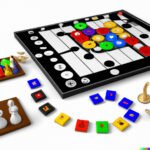Classic board games have always held a special place in the hearts of people of all ages. From ancient times to the modern day, these classic games have brought joy and entertainment to countless individuals and families. Whether it’s the strategic thrill of Monopoly, the wordplay of Scrabble, or the suspense of Clue, classic board games continue to captivate players around the world.
As we delve into the history of classic board games, we will uncover their fascinating evolution from ancient origins to their modern-day popularity. From early games like Senet and Mancala to the iconic titles we know and love today, these timeless games have stood the test of time. Additionally, we will explore how classic board games have transitioned from traditional tabletop form to digital counterparts, paving the way for a new era of gaming.
Furthermore, we will analyze the social aspect of classic board games and how they bring people together. These games have a unique ability to create bonds and cherished memories among friends and family members. Additionally, we will also explore the benefits of playing classic board games, such as honing strategic thinking and problem-solving skills. So sit back and join us on a journey through the history, allure, and future of classic board games.
History of Classic Board Games
Early Origins
Classic board games have a rich and diverse history that dates back to ancient times. The earliest known board game is believed to be the Royal Game of Ur, which was played in Mesopotamia over 4,600 years ago. Other ancient civilizations such as the Egyptians and the Greeks also had their own variations of board games, demonstrating the enduring appeal of this form of entertainment throughout history.
Medieval and Renaissance Era
During the Middle Ages and the Renaissance, Europe saw the rise of popular classic board games such as Chess and Backgammon. These games were not only a source of entertainment but also served as a way to practice strategic thinking and decision-making skills. The rules and designs of these games continued to evolve over time, reflecting changes in society and culture.
Modern Board Games
The 19th and 20th centuries witnessed the rise of modern classic board games that are still beloved today. Games like Monopoly, Scrabble, Clue, and Risk became household names, providing families and friends with hours of fun and friendly competition. With advancements in technology and manufacturing, these games were able to reach a wider audience and become timeless favorites for generations to come.
From ancient origins to modern-day favorites, classic board games have endured through the ages, capturing people’s imaginations across different cultures and time periods. As we continue to embrace digital innovation in gaming, it’s important not to forget the timeless appeal of gathering around a physical board game for an enriching social experience.
The Most Iconic Classic Board Games
When it comes to classic board games, there are a few iconic titles that have stood the test of time and continue to be beloved by generations of players. Monopoly, Scrabble, and other timeless favorites have become synonymous with family game nights and friendly competitions. These games have become more than just a source of entertainment – they hold a special place in our hearts and memories.
Monopoly, first introduced in 1935, has become a staple in many households around the world. The game revolves around players buying, selling, and trading properties to build their own little empire. Its enduring popularity can be attributed to its blend of strategy, luck, and negotiation skills required to outwit opponents.
Scrabble, on the other hand, challenges players’ vocabulary and word-building skills as they create words using letter tiles on a game board. This classic game has been enjoyed by language enthusiasts for decades and continues to be a favorite choice for those who enjoy mental stimulation.
In addition to Monopoly and Scrabble, classic board games such as Chess, Checkers, Clue, and Risk also hold a special place in the hearts of many enthusiasts. The enduring appeal of these games lies in their ability to bring people together for hours of fun and friendly competition. Whether it’s the thrill of bankrupting opponents in Monopoly or the satisfaction of finding the perfect word in Scrabble, these classic board games continue to captivate players of all ages.
The Social Aspect
Classic board games have been bringing people together for centuries, providing a social outlet and an opportunity for friendly competition. Whether it’s a family game night or a gathering of friends, these timeless games have a way of creating lasting memories and bonding experiences. Here are some ways in which classic board games promote social interaction:
- Promotes Communication: Classic board games often require communication and interaction between players. Whether it’s negotiating deals in Monopoly or strategizing with your partner in Scrabble, these games encourage conversation and discussion.
- Fosters Teamwork: Many classic board games involve team play, fostering a sense of camaraderie and unity among players. Games like Pictionary or Charades require collaboration and cooperation, strengthening relationships and promoting teamwork.
- Creates Shared Experiences: Playing classic board games creates shared experiences that can strengthen bonds and create lasting memories. Whether it’s the joy of winning together or laughing at a humorous outcome, these moments bring people closer together.
The social aspect of classic board games extends beyond just the gameplay itself – it also provides an opportunity for people to come together, socialize, and enjoy each other’s company. In an age where digital devices often dominate our attention, the simple act of gathering around a board game can remind us of the value of face-to-face interaction and human connection.
Strategy and Skill
Classic board games have been a popular pastime for centuries, and for good reason. Not only do these games provide hours of entertainment, but they also offer numerous benefits for players of all ages. From enhancing critical thinking skills to promoting strategic decision-making, classic board games are much more than just a source of fun.
One of the key benefits of playing classic board games is the opportunity to develop strategic thinking and problem-solving skills. Players must carefully plan their moves, anticipate their opponents’ actions, and adapt their strategies in response to changing game conditions. This mental stimulation can help improve cognitive abilities and foster a more analytical mindset in both children and adults.
Furthermore, classic board games can also enhance social skills and promote healthy competition among players. Whether it’s negotiating deals in Monopoly or challenging friends to wordsmith battles in Scrabble, these games encourage communication, collaboration, and sportsmanship. This social aspect not only strengthens relationships but also teaches valuable lessons about teamwork and fair play.
In addition to the mental and social benefits, playing classic board games can also be a great way to unwind and de-stress. Whether it’s a family game night or a casual get-together with friends, these timeless games provide an enjoyable escape from the stressors of daily life. With so many positive attributes, it’s no wonder that classic board games continue to remain a beloved pastime for people around the world.
- Enhances critical thinking skills
- Promotes strategic decision-making
- Develops social skills and healthy competition
- Provides an enjoyable escape from daily stressors
Nostalgia and Memories
Classic board games have been a staple in households for decades, providing countless memories and cherished moments for players of all ages. Whether it’s the thrill of buying properties in Monopoly, forming words in Scrabble, or sinking battleships in Battleship, these timeless games have a special place in our hearts.
The nostalgia associated with classic board games often stems from the joy and laughter shared with friends and family during game nights, making them an integral part of our lives.
For many people, playing classic board games brings back memories of childhood and simpler times. These games were often a source of entertainment before the age of smartphones and video game consoles, offering a way to bond with loved ones and engage in friendly competition. The tactile experience of rolling dice, moving pieces across the board, and drawing cards adds a nostalgic charm that cannot be replicated by digital alternatives.
In addition to the memories created through gameplay, classic board games also hold sentimental value as they are often passed down through generations. Many families have heirloom copies of popular games that have been enjoyed by parents, grandparents, and grandchildren alike. This tradition further cements the emotional connection people have with these beloved classics.
| Classic Board Games | Nostalgia Factor |
|---|---|
| Monopoly | A family favorite for generations |
| Scrabble | Evoke memories of challenging wordplay |
| Battleship | Sink ships and create lasting memories |
The Evolution of Classic Board Games
The transition of classic board games from traditional to digital formats has brought about numerous changes in the way people play and enjoy these timeless games. With the advent of technology, classic board games have become more accessible and convenient, allowing players to enjoy their favorite games anytime, anywhere.
From Physical to Virtual: The Rise of Digital Versions
Classic board games such as Monopoly, Scrabble, and Chess have all made the leap from physical board game form to digital versions. This has opened up a whole new world of possibilities for players, as they can now play against friends and strangers from around the world without needing to be in the same physical location.
Enhanced Gameplay Experience: Features and Animations
Digital versions of classic board games often come with added features and animations that enhance the overall gameplay experience. From interactive game boards to special effects and audio cues, these digital adaptations bring a new level of immersion to the classic board game experience.
Accessibility and Convenience: Playing Anytime, Anywhere
One of the biggest advantages of digital classic board games is the convenience they offer. Players no longer need to set up a physical game board or keep track of pieces – everything is managed digitally. Additionally, digital versions allow for quick and easy gameplay on various devices such as smartphones, tablets, and computers.
The Future of Classic Board Games
In conclusion, it is evident that classic board games hold a timeless allure that continues to captivate people of all ages. These games have a rich history that dates back to ancient times, and they have continued to evolve and adapt to the modern era. From iconic games like Monopoly and Scrabble to the social aspect of bringing people together, classic board games offer numerous benefits beyond just entertainment.
One of the most significant aspects of classic board games is the way they bring people together. Whether it’s family game night or a casual get-together with friends, classic board games create opportunities for bonding, laughter, and friendly competition. The social aspect of these games cannot be understated, as they provide a space for meaningful interactions in an increasingly digital world.
As classic board games continue to make a comeback in the digital age, it is clear that their appeal will endure for years to come. The nostalgia and memories associated with these games, coupled with the strategic thinking and skill development they encourage, ensure that classic board games will remain a beloved pastime for generations.
And while digital versions may offer convenience and accessibility, there is something irreplaceable about gathering around a physical game board and engaging in timeless gameplay with loved ones. In this way, we can look forward to a future where classic board games continue to thrive alongside their digital counterparts.
Frequently Asked Questions
What Are the Top 10 Board Games of All Time?
The top 10 board games of all time are a matter of personal preference, but some consistently popular choices include Monopoly, Scrabble, Clue, Risk, Catan, Chess, Checkers, Ticket to Ride, Carcassonne, and Pandemic.
What Are the Most Popular Classic Board Games?
Classic board games that have stood the test of time and remain popular include Chess, Checkers, Backgammon, Mahjong, Parcheesi, and Go. These games have been played for centuries and continue to be beloved by people of all ages.
What Is the Most Loved Board Game?
The most loved board game is difficult to determine as it varies from person to person. However, games like Settlers of Catan, Ticket to Ride, and Pandemic often receive high praise for their engaging gameplay and ability to bring people together for hours of fun.

I love playing all kinds of games – from classics like Monopoly to modern favourites like Ticket to Ride.
I created this blog as a way to share my love of board games with others, and provide information on the latest releases and news in the industry.





